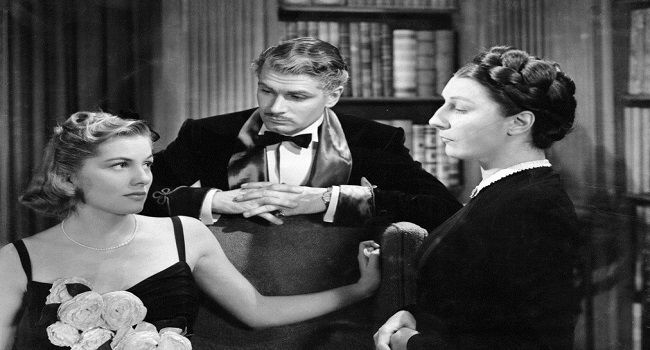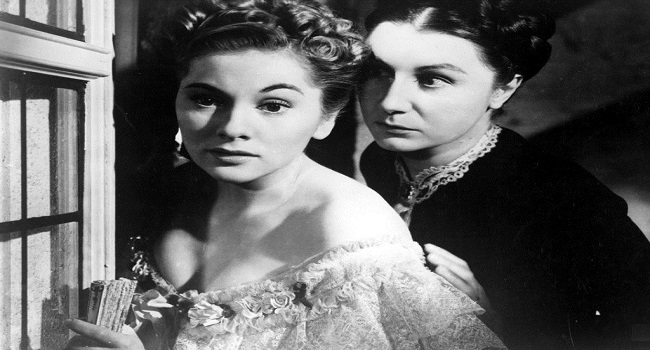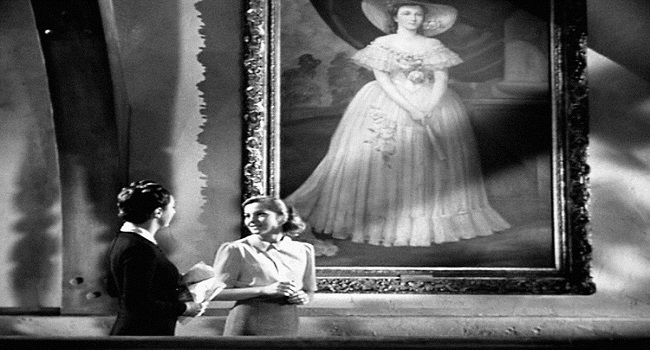“Do you think the dead come back and watch the living?”
This is the question that haunts not only the characters within Alfred Hitchcock’s Rebecca, but also the lavish Manderley estate in which many of them reside. The magnificent mansion, which includes its own lakeside cottage, is equally majestic and enigmatic. Despite its towering stature, Manderley cannot be seen from the road. Shrouded behind dense trees and iron gates, as if it has something to hide, it is a symbol of the decadence and mystery that encapsulates the film itself.
Portrayed as a dreamlike place from the opening frames of the film, Manderley is not a place where fantasies come true, but rather where nightmares begin. While modern films try to generate chills by having doors mysteriously slam shut, or using eerie whispers within hallway corridors, Hitchcock is content to simply let the memories of the dead fester like a plague amongst the living. This provides a haunting feel to the film’s dark take on the pauper to princess fairy tale.
Based on the novel by Daphne du Maurier, the film revolves around an unnamed woman (Joan Fontaine) who, during a whirlwind trip in Monte Carlo, goes from being a meager companion to Mrs. Van Hopper (Florence Bates) to marrying the wealthy Maximilian ‘Maxim’ de Winter (Laurence Olivier). The owner of the Manderley estate, Maxim’s wealth cannot hide the heavy emotional baggage that he carries with him daily. His first wife Rebecca, whom we never see, died in a mysterious boating accident a year earlier. Visibly afraid to even gaze at the sea for too long, Maxim has not been the same since. In fact, he was contemplating suicide, or at least that is how it appears, when he first met the woman who would eventually become the new Mrs. de Winter.
While madly in love with Maxim, it does not take the new Mrs. de Winter very long to realize that she has a lot to learn about high society. Mrs. Van Hopper, her now former employer, is the first to remark that she does “not know what it means to be a great lady.” Hitchcock subtly reinforces this message several times throughout the film, including when Mrs. de Winters arrives at Manderley for the first time. At a lost as to the customs that are seemingly inherent to those who are true members of the upper crust of society, Mrs. de Winter struggles to adapt to her new life. Making things even more difficult is the constant disapproving gaze of Mrs. Danvers (Judith Anderson), a key member of Manderley’s service staff, who was Rebecca’s personal maid.
As Mrs. de Winter slowly learns the ropes, the shadow of Rebecca hovers over her like a dark unrelenting cloud. Aside from seeing Rebecca’s initials everywhere, and hearing the constant praise about what a great woman she was, Mrs. de Winter finds it difficult to get any real information about the deceased woman. With her husband becoming more distant, and people like the suave Jack Favell (George Sanders) planting seeds of doubt about Rebecca’s death being an accident, Mrs. de Winter begins down a path to find answers. What she does not realize though is that there are enough secrets at Manderley to fill both the east and west wings of the mammoth estate.
One of the things that struck me immediately about Rebecca was the way in which Hitchcock utilizes the social class structure to maximum effect. To emphasize the magnitude of Rebecca’s impact on others, Hitchcock ensures that the new Mrs. de Winter is viewed as small as possible from the very beginning. Maxim frequently talks to her as if she is a childlike doll who does not understand the ways of the grown up world. When they go for a stroll he insists that she wear a coat stating that “you can’t be too careful with children.” Hitchcock further reduces the current Mrs. de Winter’s authority by showing that even a maid like Mrs. Danvers can intimidate her. There is a great scene early on where both Mrs. de Winter and Mrs. Danvers reach for a pair of dropped gloves at the same time. Signifying that, despite her current social standing, Mrs. de Winter is merely a maid in fancy clothing.
By reducing Mrs. de Winter’s effectiveness, Hitchcock is able to establish a grim atmosphere in which no one can escape the overpowering spell that Rebecca seems to hold over everyone. In many ways power is the one thing that most of the characters are striving for but, even in her death, Rebecca is unwilling to give up. This further adds to the borderline supernatural allure of the film. Is Mrs. Danvers instant distrust of Mrs. de Winter simply a case of loyalty to Rebecca or some deep seated madness? Even the perpetual fog that engulfs Manderley at night seems to have its own sinister design. Presenting a morning like glow from the distance, the fog, as if working in conjunction with Rebecca, masks a more tragic event within its thick hazy walls.
Nicely blending both elements of horror and romanticism, Rebecca is a film that succeeds on several levels. The performance by Joan Fontaine and Laurence Olivier hit all the right beats one would expect from this type of film. Fontaine in particular is quite good as the bride who simply wants to get a grasp on her new surroundings. However, the real standouts of the film are the supporting actors. Judith Anderson is fantastic as the manipulative Mrs. Danvers, a woman whose hatred runs deeper than the waters around Manderley. George Sanders is also quite memorable as Favell, a salesman who never misses an opportunity to try and take advantage of a situation.
As with most of Hitchcock’s work, Rebecca is an exceptional film that packs a thrilling punch. Once you reach the startling end of the film, it becomes clear that the question of whether or not the dead can come back is not that important at all. The fact of the matter is that, in our minds, the dead have never left.
10 Comments
Comments are closed.




I like Rebecca, but I’m not one of the people who thinks it’s great. My main issue is the flaccid nature of Hitchcock’s direction and the dead as a door nail acting of Joan Fontaine. Rebecca never came alive for me, and when compared to the majority of Hitch’s filmography I find ti wanting.
Of his canon, this film is probably his most straightforward work from a directorial standpoint. He restrains from employing some of the visual tricks that are more common in his other works. I can only assume that, since he was still feeling out the American studio system at the time, he chose to play it a little safer. Still, overall it worked for me.
I did not find Fontaine to be dull at all. Granted she gets overshadowed by Anderson’s great work and Sanders’ sly “where do you put old bones?” type of lines, but overall I thought Fontaine delivered what the role required.
Gotta hand it to Hitch – Between this film and NOTORIOUS, he sure does make one scary of setting down stakes in a big-ass house!
Very true. The man has a gift for squeezing fear and tension out of even the most mundane things.
Very good review. I don’t consider this one of Hitchcock’s better films, but reading your review made me think more highly of it.
Although I really liked Rebecca, I would not go as far as calling it one of the top 5 Hitchcock films I have seen. Regardless, the film has enough going for it to make it a rather memorable entry in his canon.
HI, I saw your blog through the bloghop. I have never seen the movie, but I read the book and it’s one of my favorite novels. I loved how the book never gave a name to the new Mrs. De Winter. It was always about Rebecca. Sometimes I would great frustrated with the new Mrs. De Winter, as she was so child-like. It’s like tell your husband to fire Mrs. Danvers. Put her in her place. I think it finally happened in the end.
I have yet to read the novel, but it sounds like Hitchcock stayed true to the text. Not giving Mrs. de Winter’s a proper name was such an intriguing thing to do. Since she is presented so childlike, it is almost as if she is not a real person at all. Most of the characters show the spirit of Rebecca more respect than they do Mrs. de Winters.
I didn’t think that the romanticism and the horror blended that well, to me it felt more like two or three movies than one. However, Judtih Anderson’s performance is enough for me to like Rebecca.
Funny, I did not find the shifts in tone to be that jarring. I never got the sense that it was two or three films trying to find a common voice. However, I agree with you that Anderson’s work is enough to get people to at least like the film on a certain level. She is fantastic.